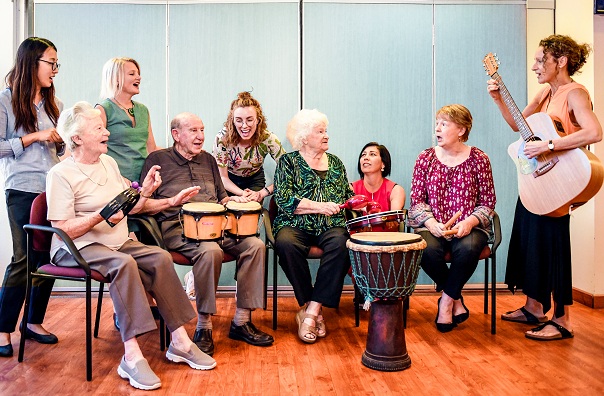Professor Felicity Baker's world-leading research is showing how music can be used as a therapeutic tool for people affected by dementia and depression.
The emergence of tailored music therapy programs is improving the lives of millions of people affected by traumatic brain injury and dementia, as well as the lives of their carers and loved ones.
Professor Felicity Baker is a music therapist, academic and co-director of the University of Melbourne’s Creative Arts Therapy Research Unit. As Head of Music Therapy, she is leading a study on the effects of music therapy on sufferers of depression and symptoms of dementia living in residential aged care facilities. She is also leading a study on the effects of music therapy on the reconstruction of identity and wellbeing post neurological injury.

“Music stimulates memory, like smell does. Music is deeply tied to our emotions and encourages our brain to make connections with our past – a function of the brain that can be damaged through age and injury.”
Autobiographical recall – our personal memory – is at the core of our identity. When that sense of self is lost we are prone to confusion, frustration and depression.
Professor Baker’s work has shown an improvement in the cognitive and motor skills of people with traumatic brain injury (TBI) and dementia, as well improvement in mood, but access to programs is limited by the relative infancy of this field of research. Until recently, studies have only been conducted on a small scale and with promising results. Larger evidence-based research results and more peer-reviewed publications are needed.
Much of Professor Baker’s research is conducted on a large scale – there are up to 500 participants in one international collaboration she leads on studying the effect of music therapy on memory function in patients with dementia. It is these results, consistently showing the benefits of music therapy, she hopes will influence health policy to fund broader access to programs.

With rates of dementia expected to increase to nearly one million people by 2050 in Australia alone, Professor Baker is making a compelling case for non-pharmaceutical interventions.
Music, she says, is a powerful therapeutic tool that helps restore emotional and psychological wellbeing.
Singing and creating lyrics and music stimulates the way we move, as well as our heart rate, breathing, language use, memory recall and emotions: Who am I now? Who was I before [the accident/illness/injury] and who am I going to be?
Part of Professor Baker’s planned international research collaboration, with partners in five European countries, involves training carers in music therapy with the development of a specially-designed app that can be accessed on a smart phone. This allows music therapy to be accessed anywhere, and at any time. Early results are promising, she says.
“Selecting music, writing lyrics and singing them is an essential part of our connections with others. These acts trigger an emotional and physiological response that our research is demonstrating can improve mood, memory and relationships with carers.”